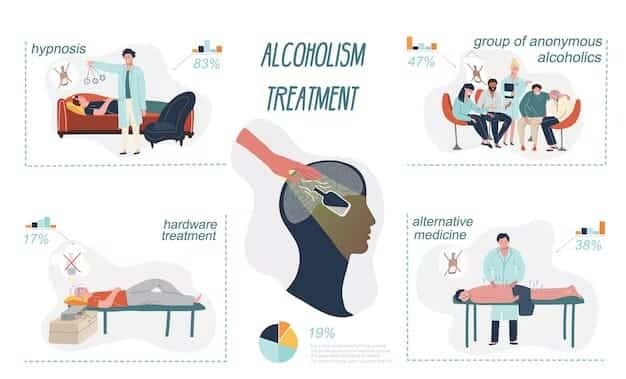Complementary and alternative medicine: Hypnotherapy, which uses the powers of the mind to improve relaxation, focus, and self-awareness. Hypnotherapy sets people free from unwanted thoughts and behavior patterns through a trance condition, helping them access their subconscious mind to make healthy changes in both body and spirit. This comprehensive guide will explore the principles and techniques of hypnotherapy, and its application within traditional medical treatments, as well as evaluate for potential benefits.
Understanding Hypnotherapy: A Holistic Approach to Healing
Hypnotherapy–a method in which the hypnotist induces a deep state of trance or relaxation. The subject becomes highly receptive to suggestions and visual imagery. Many people mistakenly believe that hypnosis involves mind control or some loss of consciousness, according to the experts. Instead, it promotes an acute state of readiness, providing a channel for the exploitation inside oneself and one’s ability to reorganize.
A Brief History and Development of Hypnotherapy
Hypnotherapy has a history going back many centuries. Its origins can be found in the ancient rituals and practices of shamans, and healers. Yet the modern idea of hypnotherapy dates only from 205 years ago, with Austrian physician Franz Anton Mesmer. Mesmer believed that the body contained an imbalance of magnetic fluids which caused illness and used hypnotic techniques to achieve a balance. When hypnotherapy began to be accepted by the medical community in the middle of this century, it was brought forward largely because of its association with Milton H. Erickson, a famous psychiatrist from Utah.
How Hypnosis Works: The Subconscious Mind
Hypnosis uses the mind’s ability to reach altered states of consciousness. During hypnotherapy, an individual is put into a deeply relaxed state and his subconscious mind can be reached. In this receptive condition, the critical faculties of the conscious mind are temporarily neutralized, and therapeutic suggestions may be accepted by the subconscious. The subconscious has a potential that enables hypnotherapy to bring about changes in behavior, reduce physical symptoms, and uplift mood.
The Role of the Hypnotherapist: Guiding Transformation
A good hypnotherapist is required to help people pass through the process of being hypnotized and undergo their changes. Specialists in hypnosis receive intensive training, learning the principles and techniques at their disposal for suggestions and imagery to be safe and effective. They are here to help people define their goals, resolve root problems, and tailor individual hypnotherapy sessions. With their experience, hypnotherapists in turn help people to take control of themselves and bring about permanent improvements.
Combining hypnotherapy with conventional medical treatment
Hypnosis does not replace traditional medical care, but it can be complementary. Hypnotherapy, with its holistic approach to healing aimed at enhancing the effect of traditional therapies and promoting personal well-being. So how can hypnotherapy be applied in various areas of medicine? Let’s take a look.
Hypnotherapy in Physical Medicine: Managing Pain and Promoting Healing
Hypnotherapy has proved to be very effective in the area of pain management. It can also be helpfully used as an adjunct to medical intervention, by modifying the perception of pain and encouraging relaxation. Studies have shown that it can help deal with pain caused by burns, cancer, fibromyalgia, or migraines. Also, hypnotherapy can be a tremendous aid in the healing process after operations and dental procedures as well as for chronic conditions.
Hypnotherapy in Mental Health: Addressing Anxiety, Depression, and Stress
In the field of mental health, hypnosis is a good way to handle anxiety, depression, and stress. Through reaching the subconscious mind, hypnotherapy allows people to confront and deal with the hidden origins of their emotional pain. Its suggestions are targeted, selected imagery can relax the mind and change negative thought patterns. It also strengthens coping mechanisms. In addition, hypnotherapy has been shown to have a positive effect on phobia-related symptoms as well as post-traumatic stress disorder (PTSD) and insomnia.
Hypnotherapy in Behavioral Medicine: Breaking Unhealthy Patterns
Hypnotherapy is also effective in the area of behavioral modification. Through entering the subconscious mind, hypnotherapists can help people recognize and break old negative behavior patterns. Hypnotherapy can give you the power to break away from unhealthy habits including smoking, overeating, and addictions of any kind. Through suggestion and imagery, hypnosis can encourage positive behavior and provide an additional inducement for change.
Hypnotherapy in Complementary Medicine: Embracing Holistic Healing
Hypnotherapy provides a holistic approach to healing in the field of complementary medicine. For example, hypnotherapy integrates mind and body to treat the whole person rather than just dealing with symptoms. It complements other therapies such as acupuncture, chiropractic care, and herbal medicine by enhancing their effects; it also promotes overall health. Hypnotherapy can integrate the mind and body, release the natural healing mechanisms in your own body, and walk beside you on this wellness journey.
The Hypnotherapy Experience: What to Expect
When we talk about hypnotherapy as an alternative treatment, it is important to know what you can expect from a session. From the first consultation to the actual hypnosis application, let’s explore what a typical session of hypnotherapy involves.
Consultation and Goal Setting
First, you’ll have a consultation with an experienced hypnotherapist before beginning the journey of hypnotherapy. In this session, you will talk about your medical history, present needs, and treatment objectives. So the hypnotherapist will also explain what hypnosis is, answer any questions or concerns that you may have, and make sure that you are comfortable with these ideas before proceeding.
Hypnotic Induction and Trance State
When you begin hypnosis, the hypnotherapist will first take your body into a relaxed state called trance. For example, the induction process may involve speeches that soothe subconsciously and imagery or breathing exercises to achieve a state of complete relaxation. Because your main consciousness is less active, and that of the subconscious is more receptive to therapeutic suggestions.
Therapeutic Suggestions and Imagery
In the hypnotic state, the hypnotherapist will give you suitably tailored therapeutic suggestions and imagery relevant to your needs. These suggestions range from rethinking negative thoughts to promoting relaxation, developing confidence in themselves, or addressing specific physical and emotional problems. Guiding you through this transformational process is the hypnotherapist’s role, to help you be more able and willing to make positive changes and face challenges.
Gradual Re-emergence and Reflection
At the end of a hypnotherapy session, your hypnotherapist will gently guide you back to full alertness and normal awareness. Gradually, you emerge from the trance state feeling calm and refreshed with a new sense of power. You may wish to take stock, considering what insights or adjustments in perspective you gleaned from your session.
Self-Hypnosis and Continued Practice
Your hypnotherapist, to emphasize the value of your hypnotherapy experience and encourage continued progress, may teach you some self-hypnotic procedures. With self-hypnosis, you can relax yourself and introduce therapeutic suggestions into your daily life. But with practice, many people who use self-hypnosis find it to be a powerful ally in avoiding stress and maintaining the behavior they desire.
The Science Behind Hypnotherapy: Evidence and Research
Although hypnotherapy has been widely practiced for centuries, only recently have scientists begun to explore its nature and applicability. Let us take a peek at some of the most important findings from clinical studies and trials testing hypnotherapy as an adjunctive treatment.
Pain Management and Anesthesia
Hypnotherapy is repeatedly shown effective in controlling pain and providing anesthesia. According to studies, people hypnotized have less pain and require fewer analgesics; they also recover from surgery faster. Its results have been especially satisfactory in surgery, dentistry, and chronic pain.
Anxiety, PTSD, and Phobias
Hypnotherapy has been effective in relieving the symptoms of anxiety disorders, post-traumatic stress disorder (PTSD), and phobias. By focusing on the causes of these problems at their source and by promoting relaxation, hypnotherapy helps patients regain control over their emotions, becoming impervious to all kinds of triggering situations. Acquired through clinical trials, we know that hypnotherapy has a marked positive effect on reducing anxiety and enhancing general well-being.
Smoking Cessation and Addictions
Another area in which hypnotherapy has proven successful is treating addictive behaviors. Studies have also found that hypnosis can increase smoking cessation rate and improve long-term abstinence. Hypnotism has also proved effective in diminishing the cravings and withdrawal symptoms linked to addictions such as alcohol or illicit drugs.
Sleep Disorders and Insomnia
Hypnotherapy is a powerful weapon against sleep disorders and insomnia. Relaxation through hypnosis combined with addressing the root causes that throw people’s sleep out of whack can bring about peaceful slumber and a sound pattern for getting it. According to clinical trials, participants who received hypnotherapy have seen improvements in the quality of their sleep, reductions in time taken before falling asleep (a measure known as latency), and decreases in daytime somnolence.
Seeking Professional Hypnotherapy: Finding the Right Practitioner
If hypnotherapy is to be used as a complementary treatment, the person must seek out someone who has done their time in training and practice. Here are some key considerations when seeking a professional hypnotherapy practitioner:
Credentials and Training
Choose a hypnotherapist who has received the necessary training and is certified or licensed appropriately. Search for practitioners who have received formal education in hypnotherapy with reputable institutions. Moreover, think about their years of experience and whether they have any special training in particular areas.
Personal Connection and Rapport
Establishing a solid relationship and feeling at ease with your hypnotherapist are prerequisites for successful therapy. Set up an introductory consultation or telephone conversation to assess their communication skills, willingness to listen, and understanding of your special situation. In the hypnotherapy process, trust and mutual respect are very important.
Reviews and Testimonials
Research the hypnotherapist’s reputation by going through reviews and testimonials of past clients. Seek feedback on their professionalism, results, and concern for client satisfaction. The reassurance and insight of positive reviews, and success stories reveal much about the hypnotherapist.
Cost and Accessibility
Think about how much a hypnotherapy session coyou and compare that with your budget. Some practitioners offer package deals or sliding-scale fees to fit different financial circumstances. Also, consider the convenience and accessibility of their practice location. If you will need to come often, this is especially important.
Unlock Your Potential: Embrace Hypnotherapy for Transformation
Hypnotherapy can be a powerful means of healing and personal change. An intrinsic power exists in your mind. With its aid, you can conquer obstacles, banish symptoms, and make lasting changes. If you want to escape from pain; reduce anxiety; or alter habits, hypnotherapy can help guide your way as you travel towards health and well-being. Take the first step toward becoming what you can be, and challenge yourself with hypnotherapy.
Disclaimer: Hypnotherapy is an adjunctive the, not not a replacement for medical advice or treatment. Check with your healthcare provider before you incorporate hypnotherapy into your healthcare regime.







